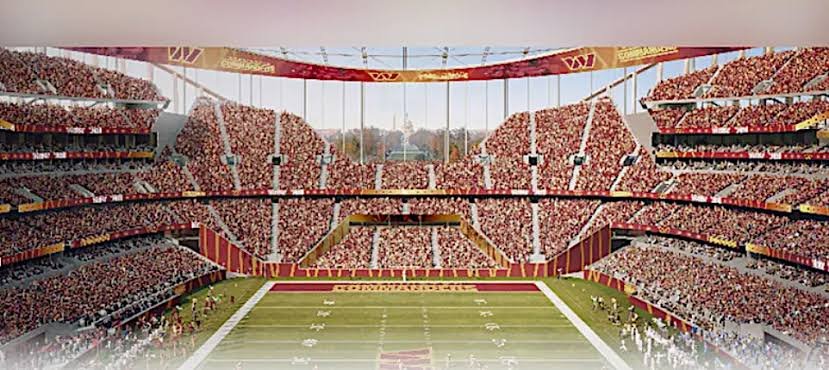In a stunning political twist, former President Donald Trump has threatened to block the Washington Commanders’ $3.7 billion stadium deal in the nation’s capital unless the NFL team reverts to its former “Redskins” name. This bombshell has ignited fierce debate, shaking the foundation of an already complex stadium negotiation.
The Commanders changed their controversial name in 2020 amid growing criticism that the term “Redskins” was a racial slur deeply offensive to Indigenous peoples. The team adopted a new identity, hoping to move forward from a decades-long battle over its branding. Now, Trump’s demand threatens to pull the franchise back into a cultural firestorm.
The proposed stadium is a centerpiece of Washington, D.C.’s plan to bring the team back from its current home in Maryland. Designed as a state-of-the-art facility expected to open in 2030, the project is seen as a major economic and cultural boost for the city. Trump’s intervention, however, casts a shadow over this vision.
Despite limited direct control over D.C.’s local affairs, Trump hinted at using federal authority to impose restrictions or block the stadium plan. This unprecedented move raises questions about the balance of power between federal and local governance and how political influence can affect major sports ventures.
Indigenous rights groups have long fought against the use of the “Redskins” name, viewing it as a symbol of harmful stereotypes and historical trauma. Organizations like the National Congress of American Indians have vocally opposed Trump’s push to restore the name, emphasizing respect and sensitivity toward Native American communities.
Conversely, a smaller faction, including groups like the Native American Guardian’s Association, supports the name’s continued use, framing it as a tribute rather than an insult. This divide underscores the ongoing national conversation about heritage, identity, and the evolving meaning of sports team branding.
The Commanders’ ownership has remained firm in its commitment to the new team name, signaling no intention to revert despite mounting political pressure. The team has not publicly responded to Trump’s recent threats, but insiders suggest the standoff could complicate stadium financing and timelines.
Public reaction has been intense and polarized. Some fans and commentators back Trump’s call for tradition and nostalgia, seeing the “Redskins” name as an integral part of the franchise’s history. Others condemn the proposal as a regressive step, arguing that sports should lead in promoting inclusion and respect.
As the debate rages on, the future of the stadium project hangs precariously. Local government officials are caught between supporting the stadium’s economic benefits and navigating the politically charged environment stirred by Trump’s demand. How this standoff resolves could set a precedent for future stadium deals across the country.
The broader sports world watches closely as this saga unfolds. The Washington Commanders’ situation mirrors similar controversies faced by other teams, such as the Cleveland Guardians, who changed their name from the Indians amidst similar calls for cultural sensitivity and progress.
Experts warn that the stadium impasse reflects deeper societal tensions over race, history, and the symbols we choose to represent ourselves. The ultimate decision will not only impact a sports franchise but also the ongoing dialogue about reconciliation and cultural respect in America.
Meanwhile, Indigenous groups continue to advocate for meaningful change, urging all sports franchises to consider the impact of their branding on marginalized communities. Their voices remain a crucial part of this story, reminding the public of the real human histories behind the controversy.
As Washington braces for what could be a protracted conflict, one thing remains clear: this is more than a stadium or a name. It’s a powerful intersection of politics, culture, and identity that will shape the city’s—and the nation’s—sports landscape for years to come.
